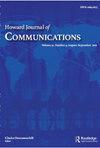神话化马迪巴:神话、抵抗和全球化后总统时代——巴拉克·奥巴马的纳尔逊·曼德拉系列演讲
IF 0.8
Q3 COMMUNICATION
引用次数: 0
摘要
在南非约翰内斯堡举行的2018年纳尔逊·曼德拉系列讲座上,美国总统巴拉克·奥巴马发表了他卸任后的首次重要公开演讲。在这次演讲中,奥巴马运用了离任后的修辞手法,进一步将这位已故南非领导人神化,帮助他成为神话中的“马迪巴”,全人类抵抗、进步和坚持不懈的化身。在复兴的、全球化的、种族主义的右翼民粹主义运动的背景下,本文探讨了奥巴马是如何通过构建神话修辞的三个基本要素——宇宙、主角和叙事教训——来帮助放大这个神话版本的曼德拉,激发人们的反抗。本文还通过强调现代后总统时代的制度和修辞力量及其不断发展的全球影响力,重振了对后总统时代公共演讲的研究。最后,本文思考了神话修辞在推进和巩固反种族主义实践、信仰和结构方面所起的作用,并最终将现代神话话语定位为通过修辞继续抵抗的有益催化剂。本文章由计算机程序翻译,如有差异,请以英文原文为准。
Mythologizing Madiba: Myth, Resistance, and the Globalized Post-Presidency in Barack Obama’s Nelson Mandela Lecture Series Address
Abstract In his first major post-presidential public address, President Barack Obama spoke at the 2018 Nelson Mandela Lecture Series in Johannesburg, South Africa. In this address, Obama lent the weight of the rhetorical post-presidency to further mythologize the late South African leader, helping to transform him into the mythic “Madiba,” the embodiment of resistance, progress, and perseverance for all of humankind. Set against the backdrop of a resurgent, globalized, and racist right-wing populist movement, this essay explores how Obama helped magnify this mythic version of Mandela to inspire resistance through the three basic elements that structure mythic rhetoric: the universe, the protagonist, and the narrative lesson. This essay also reinvigorates the study of post-presidential public address through an emphasis on the institutional and rhetorical power of the modern post-presidency and its evolving global reach. Finally, this essay contemplates the role mythic rhetoric can play in advancing and solidifying anti-racist practices, beliefs, and structures, and ultimately positions modern mythic discourse as a helpful catalyst for the continuation of resistance through rhetoric.
求助全文
通过发布文献求助,成功后即可免费获取论文全文。
去求助
来源期刊

Howard Journal of Communications
COMMUNICATION-
CiteScore
2.70
自引率
10.00%
发文量
23
期刊介绍:
Culture, ethnicity, and gender influence multicultural organizations, mass media portrayals, interpersonal interaction, development campaigns, and rhetoric. Dealing with these issues, The Howard Journal of Communications, is a quarterly that examines ethnicity, gender, and culture as domestic and international communication concerns. No other scholarly journal focuses exclusively on cultural issues in communication research. Moreover, few communication journals employ such a wide variety of methodologies. Since issues of multiculturalism, multiethnicity and gender often call forth messages from persons who otherwise would be silenced, traditional methods of inquiry are supplemented by post-positivist inquiry to give voice to those who otherwise might not be heard.
 求助内容:
求助内容: 应助结果提醒方式:
应助结果提醒方式:


